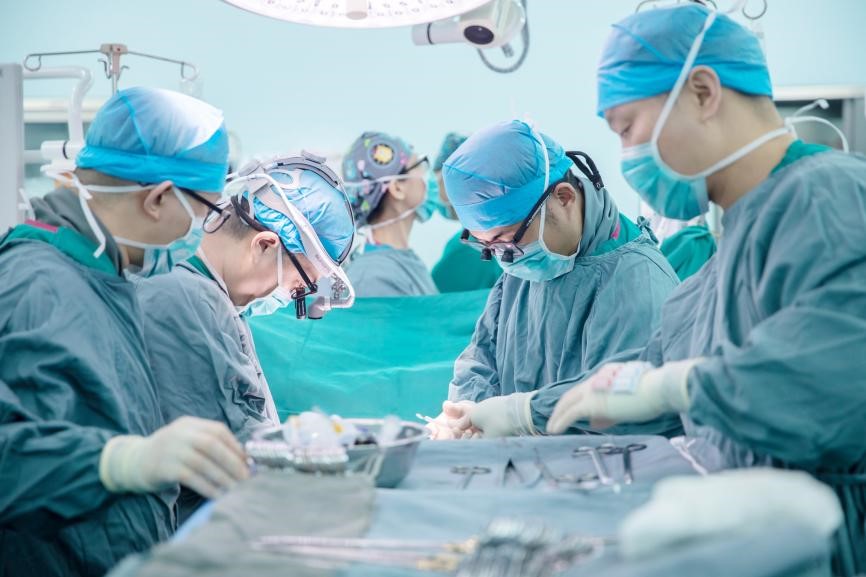“Thanks to PUMCH, I escaped from the jaws of death!” said Xiaowu, a patient with infective endocarditis who was recently admitted by PUMCH. All the four valves of his heart had been infected and he had cardiac cachexia, a condition typical of massive weight loss, extreme malnutrition, and frailty. Though his infection was still in active phase and the general conditions were extremely unfavorable for a surgical cure, the cardiac surgery team successfully replaced all the four valves. Xiaowu recovered well and was recently discharged.
In March 2022, the 33-year-old Xiaowu began to have recurrent fevers. After enduring it for more than a month, Xiaowu began to develop edema in many body parts and decrease urine output. He was diagnosed with Tetralogy of Fallot when he was a child and recovered through a surgical correction 16 years ago. This time, Xiaowu was diagnosed with infective endocarditis, which is commonly known as one of the “fatal infectious disease syndromes”. After more than a month of anti-infection treatment at another hospital, Xiaowu lost more than 10 kilograms and became so fatigued that even going to the bathroom made him breathless, and the bacterial vegetation on his heart valves continued to fall off, leading to multiple pulmonary embolisms and lung abscesses. Seeing his condition getting worse and worse, a friend of his suggested that he seek medical care at PUMCH.
Miao Qi, the Director of the Department of Cardiac Surgery, took charge of Xiaowu’s case and soon arranged for his hospitalization. At this time point, Xiaowu already suffered from severe malnutrition, electrolyte disturbance, moderate anemia and abnormal liver function; cardiac ultrasonography indicated that vegetation also involved the aortic valve following its initial invasion to tricuspid and pulmonary valves. Given the obvious disease progression, his last hope was surgery. However, the interrelationship between surgical indications, surgical risks and surgical timing was very complex, for which there is no consensual guideline in China yet.
Could the operation be performed? The cardiac surgery team was in a dilemma. Given that Xiaowu had lung abscess, sepsis and immune deficiency, the risk of postoperative valve reinfection would be high if surgery was performed immediately; nevertheless, it was still not clear whether Xiaowu’s congenitally malformed heart, which already underwent a major operation before, could sustain another major surgery again. But if they only administrated the conservative anti-infection treatment, the vegetation on the aortic valve could fall off any minute and cause life-threatening consequences due to embolisms in vital organs. Furthermore, Xiaowu had already developed significant heart failure, and it could also be life-threatening if his condition continued to deteriorate.
At the firm request of the patient and his family, the Department of Cardiac Surgery decided to take a leap of faith. The multidisciplinary team composed of personnel from the Department of Infectious Diseases, Clinical Nutrition, Anesthesiology Operating Room, Blood Transfusion, and ICU provided support in their respective way, actively helping to identify pathogens, determining antibiotics regimen, correcting heart failure and malnutrition, and improving anemia.
The intraoperative situation shocked the cardiac surgery team: Xiaowu’s tricuspid and pulmonary valves had been completely infected and damaged by bacteria to the point of completely losing the valve function. The bacteria had also infected the aortic valve, mitral valve, and a small defect in the ventricular septum. Bacterial infection of all four valves of the heart is rare and only scarcely reported in literature. In addition, Xiaowu was extremely frail and could only tolerate a limited time of surgery. How to reduce the surgery trauma, shorten the surgery time, and coordinate the functions of the four prosthetic values? Without past experience of colleagues to draw upon, the surgeons could only improvise and make decisions as they went along.
Under the concerted efforts of the team, which is equipped with excellent surgical skills and superb composure, the operation was successfully completed. Thanks to the post-operative support and management of the ICU team, Xiaowu was no longer in critical conditions on the second day after surgery. At present, Xiaowu has been discharged from the hospital; thanks to the good recovery, he has put on around 6 kilograms.
Based upon its internationally leading caseloads of patients with severe infective endocarditis, the Department of Cardiac Surgery, PUMCH has summarized rich clinical experience and evidence-based knowledge and taken the lead in promoting and practicing the international consensus for surgery in the acute phase of infective endocarditis in China. Director Miao Qi said that with good timing and appropriate surgery maneuver, the perioperative mortality rate of endocarditis surgeries can be effectively reduced.

Director Miao Qi (second from left) and the team were totally absorbed in performing the surgery
Reporter: Gan Dingzhu
Correspondent: Liu Jianzhou and Zhao Yanxue
Picture courtesy: Sun Liang
Translator: Liu Haiyan
Editor: Liu Xingrong and Wang Yao
